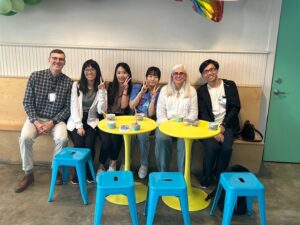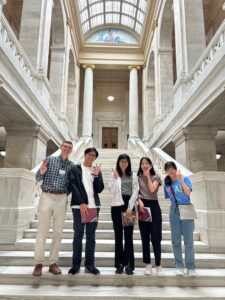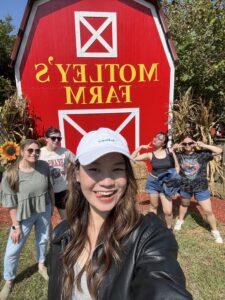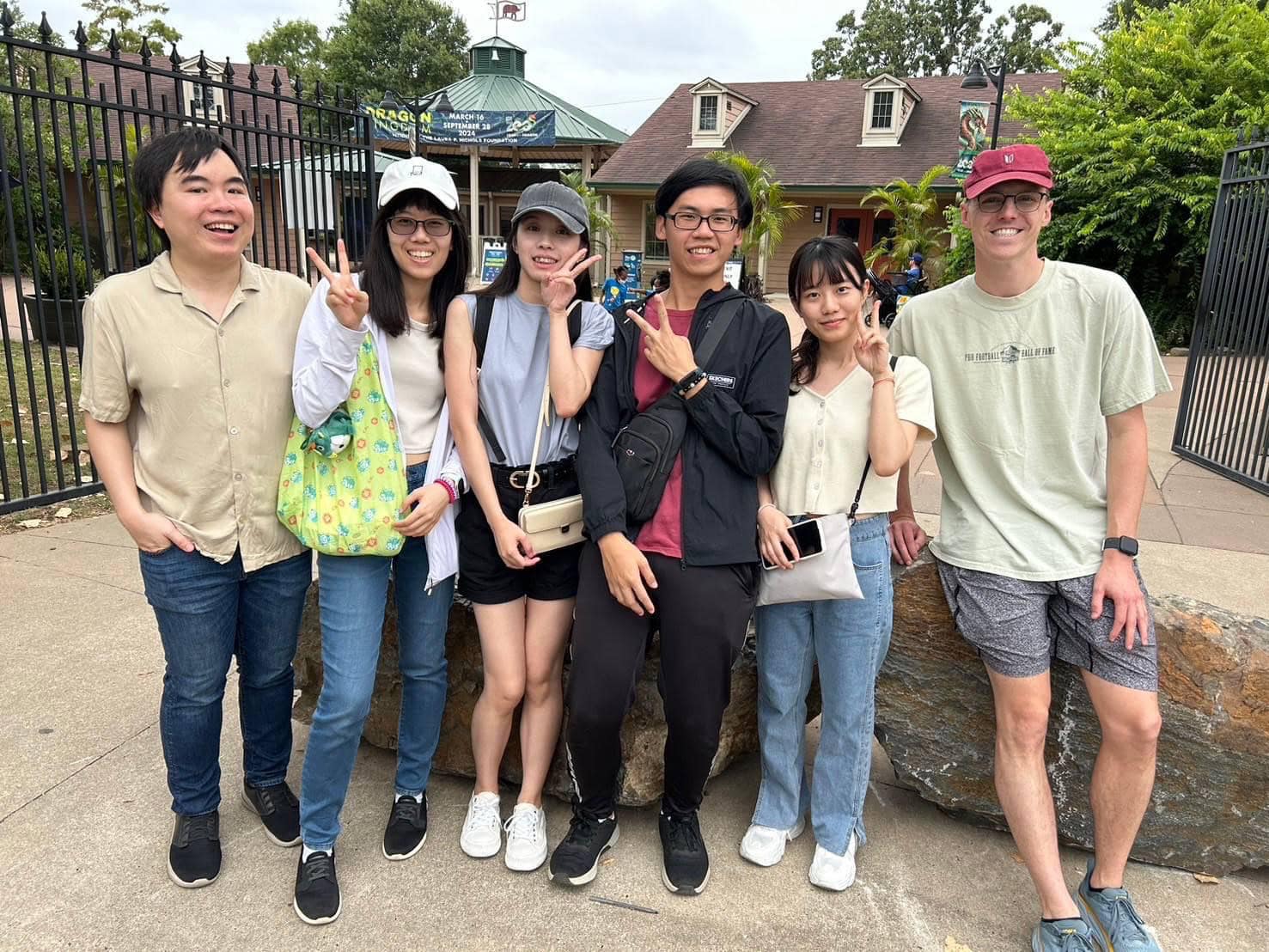Far From Home, Pharmacy Students Learn Much at UAMS
| Nine students from universities in Taiwan and Thailand visited the University of Arkansas for Medical Sciences (UAMS) for several weeks of rotations recently as part of a longstanding exchange program with the UAMS College of Pharmacy.

College of Pharmacy Dean Cindy Stowe, Pharm.D., (second from right) joined the students for an afternoon in downtown Little Rock.
The annual tradition, which originated with an agreement in the 1980s, has enabled dozens of students to learn about pharmacy at UAMS. In turn, the College of Pharmacy allows its students to choose from rotations in Taiwan and Thailand as well as Italy, for a unique experience thousands of miles away from home. It’s a collaboration that benefits everyone involved.
“These international exchanges with Thailand and Taiwan are especially valuable for our students and theirs,” said Seth Heldenbrand, Pharm.D., the College of Pharmacy’s associate dean of experiential education. “We encourage our students to interact and build relationships with visiting students while they are here in the summer and early fall, since our students will get to build on that during their international rotations. The Taiwan exchange is special, as it is an interprofessional exchange with both nursing and pharmacy students, which is the first of its kind for UAMS.”
Students arrive from Kaohsiung Medical University in Taiwan and Silpakorn University in Thailand each year, usually in August and September. UAMS and the two universities’ exchange programs began several years ago, and they have histories dating back even further.
In 1980, then-UAMS Chancellor Harry Ward, M.D., signed an exchange agreement between UAMS and Kaohsiung. The regular exchange, begun in 2012 after a long delay, brings six Kaohsiung students to UAMS and six UAMS students to Kaohsiung each fall. The program continues to evolve, adding nursing students in 2018.
Nalin Payakachat, Ph.D., associate professor in the Department of Pharmacy Practice, helped establish the Silpakorn exchange program. Payakachat, who taught at Silpakorn from 1994 to 2000, coordinated the visit of two Silpakorn pharmacy residents in 2016. Following this success, then-UAMS College of Pharmacy Dean Keith Olsen, Pharm.D., signed a memorandum of understanding June 15, 2018, to establish a new exchange program with Silpakorn. The annual exchange brings three students from each college to study at the other.

The Kaohsiung students took in a tour of the State Capitol Building as part of their cultural immersion in Little Rock.
This year, the College of Pharmacy hosted four fifth-year Kaohsiung students for four weeks of rotations in August, and three sixth-year Silpakorn students for five weeks of rotations in September and October. All of the students are in their final year of pharmacy school.
The exchange program allowed students to observe differences between Eastern and Western pharmacy education up close, from lectures and labs to tours and other cultural experiences off-campus.
Fifth-year Kaohsiung students Joe Tian, Candy Hung, Angela Yu and Tina Chang said they appreciate the different approach to pharmacy in the United States — with more specialized roles and a variety of responsibilities.
“Our work tends to be more routine, while American pharmacists have a more diverse and specialized scope of practice. I think this is something we can learn from,” Tian said. He added that Taiwanese pharmacy education focuses heavily on traditional Chinese medicine, and that clinical skills training is less extensive, with rotations only lasting six months.
“What surprised me the most is that pharmacists in Arkansas can administer vaccines to patients and even prescribe certain medications,” Hung said. “I feel that pharmacists in Arkansas have much more authority than those in Taiwan, and are better able to use their expertise to care for patients. I will apply the knowledge, skills and attitude I learned at UAMS to my future courses.”
Outside of classes, the students were able to visit the Arkansas State Capitol and Crystal Bridges Museum of American Art in Bentonville. While on campus in Little Rock, they toured a variety of programs and facilities, including inpatient and outpatient pharmacies and labs.
Yu particularly enjoyed the compounding courses, including making capsules by hand.
“Since we haven’t done capsule experiments at [Kaohsiung] yet, it felt quite special,” Yu said. “Especially now, with machines producing capsules so quickly, witnessing the capsule-making process from scratch is truly a rare experience.”
“The most impressive experience was the activities at 12th Street [Health & Wellness Center], because there isn’t a similar organization in Taiwan where students can practice their skills and directly communicate with patients,” Chang said.

Lin Tantawiwat (center) snagged a selfie with fellow Silpakorn students Mild Thongpetch and T Chiangthong at Motley’s Pumpkin Patch, south of Little Rock.Lin Tantawiwat
Similarly to Taiwanese pharmacy education, Thai pharmacy education also allows students to apply for pharmacy school after graduating high school. No undergraduate degree is required. There are trade-offs, though, like being unable to do any paid pharmacy work until after graduation. Thai pharmacy education also includes four additional years of school before residencies.
There were many differences to take in for sixth-year Silpakorn students Mild Thongpetch, T Chiangthong and Lin Tantawiwat, particularly in how pharmacists work with manufacturers and insurance companies. They said there were also more medicines available in the United States.
“We went on specialty pharmacy rotations in outpatient in our second week,” Chiangthong said. “In Thailand we don’t have much about biologics, and I was surprised about insurance coverage for these too. It’s very different from Thailand.”
Biologics are medicines produced from living organisms, including animals, plants and microorganisms. They are commonly used in treating various forms of cancer but are also included in some vaccines and gene therapies as well as insulin for diabetic patients.
“I like that patients can get medications based on need, including biological drugs, and that insurance and the manufacturer will cover as much as they can [of the cost],” Thongpetch said. “In Thailand, manufacturers don’t cover our medicines. Our country also doesn’t have pharmacy assistants, but now I realize this job is one of the most important for helping patients a lot.”
The Silpakorn students agreed that it has been an educational and enjoyable time at UAMS.
“The thing I have liked the most while I am here is the people,” Tantawiwat said. “Everyone is so nice and kind — not only friends but preceptors in every rotation. Everyone’s willing to teach me and trying to understand what I want to say.”
